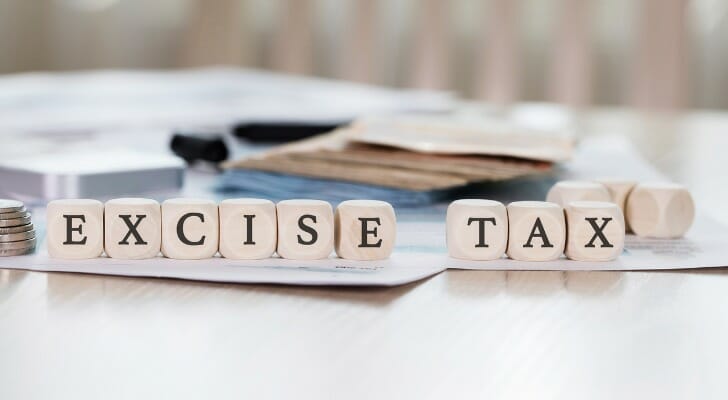

Excise taxes apply to specific goods and services. Businesses that make or sell chosen goods and services pay most of these taxes. As a consumer, you generally won’t get a bill for excise tax. If you purchase a good or service subject to an excise tax, though, you’ll pay it nonetheless. Businesses generally include the cost of the tax in the prices they charge. For help with taxes and other financial issues, consider working with a financial advisor. An advisor can help you create the right financial and tax plan for your situation.
A financial advisor may be able to help. Match with an advisor serving your area today.
Federal, state or local taxing authorities impose excise taxes. Generally speaking, in the United States these taxes are levied at the time of production or when the service is performed. For this reason, the tax is not generally seen as separate by consumers, but simply baked into the cost of the good or service.
Sales taxes and excise taxes are similar, but there are some key differences. Unlike sales taxes, excise taxes only apply to specific items or services. Sales taxes generally apply to all transactions, with limited exceptions. Also, sales tax is always at the point of sale, whereas excise taxes are more often at the point of production. This is why you can see the separate sales tax total on your receipt, while excise taxes are simply factored by the seller into pricing.
Excise taxes may not require a transaction. Likewise, they may be applied as a specific amount per item rather than as a percentage of the selling price. Excise taxes may go by other names, such as selective sales taxes or differential commodity taxes.
The list of items subject to federal excise taxes is not long but covers some sizable expense categories for both businesses and consumers. The excise taxes that generate the biggest revenue at the federal level include fuel, airline tickets, tobacco, alcohol and health-related goods services.
Here are some of the items and activities bearing federal excise taxes:

Products and services that governments wish to discourage or limit face excise taxes. These include tobacco, alcohol, firearms and gambling. Excise taxes levied for this purpose are often called “sin taxes.”
Similarly, governments use excise taxes to help cover costs related to the taxed item. For example, excise taxes on gasoline help pay for new highway construction. Other excise taxes fund activities that benefit society. For instance, a federal excise tax paid by makers of archery, fishing and boating products helps pay for wildlife conservation and management.
Excise taxes are typically stealthy taxes that consumers don’t realize they’re paying. Sometimes, however, consumers pay excise taxes directly. For example, bills for telephone services and tires include line items for excise tax.
The Internal Revenue Service sometimes makes individual retirement savers pay what it calls excise taxes but are more popularly known as penalties. Those include a 6% tax for contributing more than is allowed. Also, there’s a 10% tax on withdrawals from IRAs and other retirement accounts before age 59 1/2.
Local and state governments collect excise taxes on real estate, vehicles and other assets from individual property owners. These taxes, like IRS retirement account penalties, are more commonly known by another name. In this case, they’re usually called property taxes.
Even in its early history, the United States collected excise taxes. Congress taxed alcohol, tobacco and sugar during the early days of the republic. The IRS and Congress abolished and reinstate excise taxes on whiskey and other goods at various times. They’re still tinkering with the excise tax system today.
For instance, the 2017 Tax Cut and Jobs Act exempted some payments made by owners and lessors of privately owned airplanes from federal excise tax. And after a 2018 Supreme Court ruling repealed the federal sports gambling ban the IRS emphasized that sports wagers, like other bets, are subject to federal excise taxation. Today excise taxes are a small part of federal tax receipts. In 2017, they were $83.8 billion or 2.5% of federal tax collections.
There are two main ways of calculating excise taxes: as a percentage of value or as a fixed amount. The percentage of value approach, also known as ad valorem, pegs the tax as a percentage of the amount of the transaction or value of the property. For example, starting in 2010 with the Affordable Care Act indoor tanning services have to pay 10 percent of fees collected for tanning services as an excise tax.
The other way to calculate excise taxes is as a fixed amount per item. Tobacco and gasoline have fixed excise taxes. The federal gasoline excise tax is 18.4 cents per gallon, regardless of the price.

Federal, state and local governments collect excise taxes on specific classes of goods and services. Products seen as having high social costs, such as alcohol and cigarettes, typically face excise taxes. Taxpayers typically don’t see excise taxes, as manufacturers and sellers build them into their pricing.
Photo credit: ©iStock.com/gorodenkoff, ©iStock.com/gilaxia, ©iStock.com/TolikoffPhotography
Mark HenricksMark Henricks has reported on personal finance, investing, retirement, entrepreneurship and other topics for more than 30 years. His freelance byline has appeared on CNBC.com and in The Wall Street Journal, The New York Times, The Washington Post, Kiplinger’s Personal Finance and other leading publications. Mark has written books including, “Not Just A Living: The Complete Guide to Creating a Business That Gives You A Life.” His favorite reporting is the kind that helps ordinary people increase their personal wealth and life satisfaction. A graduate of the University of Texas journalism program, he lives in Austin, Texas. In his spare time he enjoys reading, volunteering, performing in an acoustic music duo, whitewater kayaking, wilderness backpacking and competing in triathlons.
Read More About Taxes



More from SmartAsset
SmartAsset Advisors, LLC ("SmartAsset"), a wholly owned subsidiary of Financial Insight Technology, is registered with the U.S. Securities and Exchange Commission as an investment adviser. SmartAsset's services are limited to referring users to third party advisers registered or chartered as fiduciaries ("Adviser(s)") with a regulatory body in the United States that have elected to participate in our matching platform based on information gathered from users through our online questionnaire. SmartAsset receives compensation from Advisers for our services. SmartAsset does not review the ongoing performance of any Adviser, participate in the management of any user's account by an Adviser or provide advice regarding specific investments.
We do not manage client funds or hold custody of assets, we help users connect with relevant financial advisors.
This is not an offer to buy or sell any security or interest. All investing involves risk, including loss of principal. Working with an adviser may come with potential downsides such as payment of fees (which will reduce returns). There are no guarantees that working with an adviser will yield positive returns. The existence of a fiduciary duty does not prevent the rise of potential conflicts of interest.